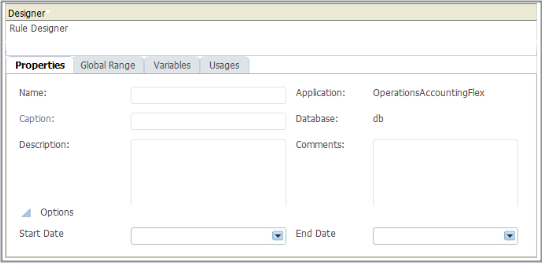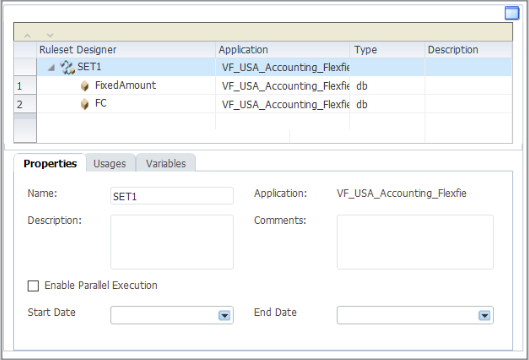Date Effective Allocation Rules and Rule Sets
Use the Date Effectivity for Allocation Rules and Rule Sets feature to generate allocations based on an allocation rule or rule set's start and end dates.
With this feature, you can prevent recurring journals from being created on the wrong dates. The Generate Allocations and Generate Intercompany Allocations processes enforce the start and end dates that you enter based on accounting period. If you don't opt in to this feature, the generation process ignores the entered start and end dates.
Where You Enter Dates
You set up allocation rules and rule sets using Calculation Manager. The date fields are in the Properties tab in the Rule Designer and Rule Set Designer.
Here's a screenshot of the Properties tab on the Rule Designer.

Here's a screenshot of the Properties tab in the Rule Set Designer.

How Dates Are Used
Recurring journals are generated only if the accounting dates for the resulting journals fall between the allocation rule (or rule set) start and end dates.
Let's say you have an allocation rule with a start date of March 31, 2019, and an end date of May 31, 2019. You submit the allocation process on June 6, 2019. Here's what happens depending on the accounting period.
|
Accounting Period |
Are Recurring Journals Generated? |
|---|---|
|
May-19 |
Yes. The accounting date for the journals is the last day of the accounting period, which is May 31, 2019. That date falls within the rule's start and end dates. |
|
Jun-19 |
No. The accounting date for the journals is the last day of the accounting period, which is June 30, 2019. That date falls outside of the rule's end date of May 31, 2019. |
How Start and End Dates Work with Rule Sets
If a rule set doesn't have a start and end date, this is what happens.
The generate allocations process checks the accounting dates for each rule's journals against that rule's start and end date. If the accounting date for any rule falls outside of its start and end date, none of the recurring journals are generated. Either all the journals for every rule in the rule set are generated, or none are generated.
If a rule set has a start and end date, a check is performed against the rule set's dates. The generate allocations process checks the accounting dates for each rule's journals against the rule set's start and end date. If the accounting date for any rule falls outside of the rule set's start and end date, none of the recurring journals are generated. Either all the journals for every rule in the rule set are generated, or none are generated.